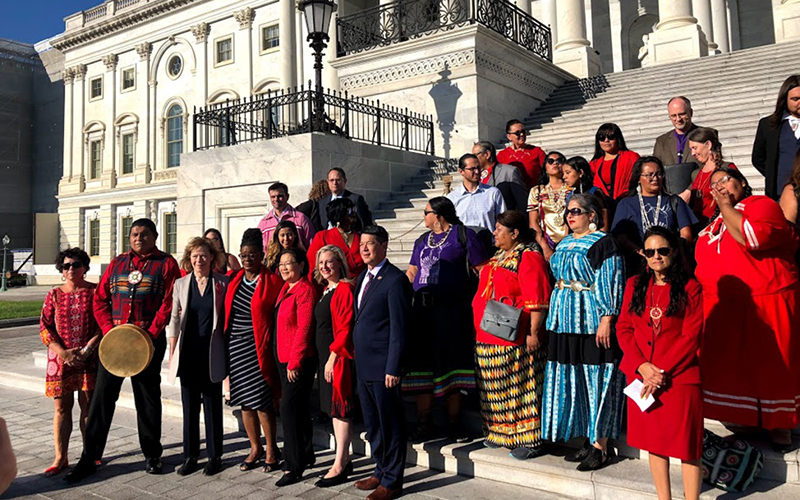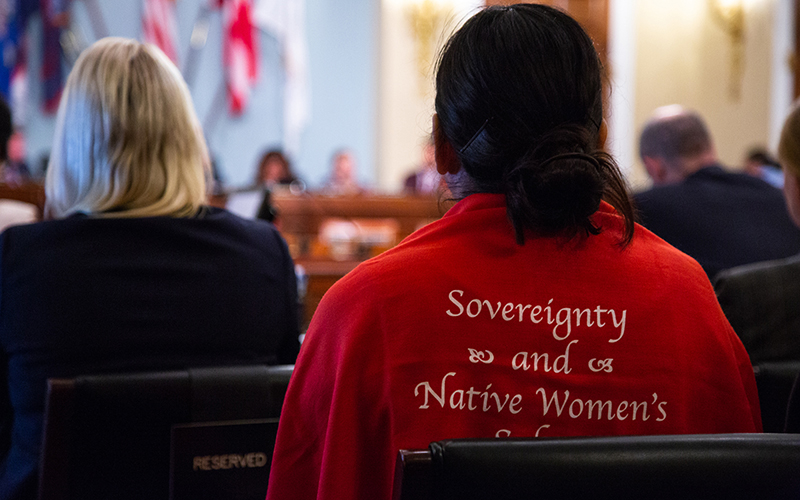
Members of the National Caucus of Native American State Legislators’ meeting on missing and murdered indigenous women pose outside the U.S. Capitol. Attendees said the problem of missing women is ages old, but only now starting to get attention. (Photo by Meredith Raimondi/National Council of Urban Indian Health)
WASHINGTON – State officials agree on this much: “Not one red penny” of the $150,000 allocated for a task force on missing and murdered indigenous women that was created in May has been seen yet. But they disagree on who’s to blame.
Arizona Sens. Jamescita Peshlakai and Sally Ann Gonzales, in Washington this week for the National Caucus of Native American State Legislators’ meeting, blamed the attorney general’s office for the delay in funding the task force that is supposed to investigate, track, and help find missing and murdered Indigenous women in the state.
An official with the attorney general’s said the money has been appropriated and blamed the delays on the legislative committee that has to OK the release of the funds.
“It’s not us,” said Ryan Anderson, a spokesman for Attorney General Mark Brnovich. “We stand ready and just can’t move forward.”
But Rep. Jennifer Jermaine, D-Chandler, and a sponsor of the bill that creating the task force, is not worried. She said she is confident the funding will come, it’s just “moving at the speed of bureaucracy.”
Besides being a sponsor, Jermaine is also a member of the Study Committee on Missing and Murdered Indigenous Women and Girls, the task force set up by HB 2570, which passed the legislature with overwhelming approval this spring.
The bill called for a task force of tribal government members and police, the attorney general, state lawmakers, a victim’s advocate and health professional and others, who are to report back to the legislature with recommendations by November 2020 at the latest.
All but one of the task force members, a social worker from an organization that “provides services to indigenous women and girls,” has been appointed. Jermaine said the first meeting was “weeks ago,” and the task force is planning to meet in Tuba City on Oct. 29 to hear from Navajo and Hopi tribe members.
But so far, the task force is operating without funding, a situation Peshlakai calls unacceptable.
“Why isn’t the money there now?” she asked Monday. “We shouldn’t have to fight for that.”
Her comments came during the National Caucus of Native American State Legislators meeting on “Improving Outcomes for Missing and Murdered Indigenous Women.” She called it an issue of “long, long, long standing” that is only now starting to come to the fore, in part because of increased outreach through social media.
“We are the throw-away population,” Gonzales said. She said it “has been an issue since time immemorial” for tribes, which lack voting power and resources to stay on cases and pursue lawsuits that might push them forward.
Peshlakai and Gonzales, Democrats from Cameron and Tucson, respectively, said the main issue is that there is no comprehensive system or active database to track cases of missing and murdered indigenous women, who are often overlooked if they are victimized outside tribal areas. A report by the Urban Indian Health Institute said 71% of Native Americans lived in urban areas in 2016.
“Any one of us can go missing, murdered, or become a statistic,” Peshlakai said, gesturing around the room at this week’s conference. “Every single one of us doesn’t have the tools to help each other.”
The task force was supposed to help address that. But the bill creating it did not include funding, which is when Brnovich’s office stepped forward and offered $150,000 to help pay expenses like travel compensation for traveling committee members.
In order for those funds to be released, however, they must be approved by the Joint Legislative Budget Committee – approval that has yet to come, all sides say.
“The Attorney General’s Office remains willing to assist with providing funding options, but we do not have independent appropriation authority and are dependent upon the legislature to expend agency funds,” Anderson said in an email.
He said the claim the attorney general’s office is withholding funds “frustrates” him, and attributes the delay to “too many cooks in the kitchen.”
“Unfortunately, amendment language was not adopted in the final days of the previous legislative session that would have provided a mechanism to assist with the funding needs of this important committee,” Anderson said in an email statement.
The budget committee met Wednesday but did not take up the question of funding for the task force, staffers said. The next meeting is not scheduled until December.
Peshlakai said she worries that by the time the funding is approved, it might be near end of the one-year window the task force has to do its work. But she said she and other advocates intend to keep up the fight.
“We’re here and not going away,” Peshlakai said. “We want respect and follow-through in not allowing our cases to fall through the cracks.”

